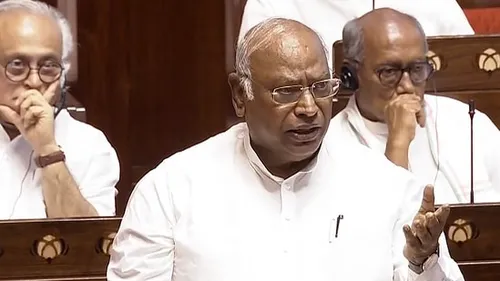BJP Government and Divisive Thinking: Kharge’s Allegations
In a recent statement, Congress President Mallikarjun Kharge accused the Bharatiya Janata Party (BJP) government of fostering divisive thinking within the country. Kharge’s comments highlight growing concerns over the socio-political climate in India and its implications for national unity. This essay will examine Kharge’s allegations, the broader context of political divisiveness in India, and the potential impacts on the country’s democratic fabric.
Table of Contents
Kharge’s Allegations
Mallikarjun Kharge’s accusation against the BJP government centers on the idea that its policies and rhetoric are contributing to increasing divisions within Indian society. According to Kharge, the BJP’s approach to governance has encouraged a culture of intolerance and discord, undermining the unity that is essential for a diverse nation like India. He argues that the government’s emphasis on religious and cultural identities rather than common national interests has exacerbated tensions among various communities.
Kharge’s statement reflects a broader concern within the opposition about the direction of Indian politics under the current administration. He suggests that the BJP’s strategies, including its communication and policy decisions, are deliberately designed to polarize public opinion and reinforce existing divides. This accusation is not merely a critique of specific policies but also a call to address what he perceives as a fundamental threat to national cohesion.
Context of Political Divisiveness
India has a rich history of political and cultural diversity, and managing this diversity has always been a challenge for its leaders. The country’s democratic framework was designed to accommodate various identities and interests while fostering a sense of unity. However, in recent years, there has been a noticeable shift in the political landscape. The rise of identity politics and the increasing influence of religious and cultural rhetoric have raised concerns about the erosion of secularism and pluralism.
The BJP, under Prime Minister Narendra Modi, has been at the forefront of promoting policies that emphasize cultural nationalism. This has included initiatives aimed at promoting Hindu cultural values and revising historical narratives to reflect a particular ideological perspective. While the BJP argues that these measures are intended to restore historical justice and promote national pride, critics claim that they contribute to societal fragmentation and alienate minority communities.
The impact of these policies has been observed in various ways. Instances of communal violence, increased polarization in political discourse, and growing public debate over issues of identity and culture have become more frequent. These developments have raised questions about the role of political leaders and parties in maintaining social harmony and fostering a sense of inclusive citizenship.
Implications for Democratic Unity
The allegations of divisive thinking and their potential impact on democratic unity are significant. A key feature of a healthy democracy is the ability to accommodate and respect diverse perspectives while working towards common goals. When political rhetoric and policies emphasize division rather than unity, they can undermine the very foundations of democracy.
Kharge’s concerns highlight the need for a balanced approach to governance that upholds the principles of secularism, pluralism, and inclusivity. For a country as diverse as India, it is crucial that political leaders work towards bridging divides rather than deepening them. Ensuring that all communities feel represented and valued is essential for maintaining national cohesion and democratic integrity.
Furthermore, fostering dialogue and mutual understanding among different groups is vital for addressing grievances and resolving conflicts. Political leaders have a responsibility to engage in constructive discourse and promote policies that contribute to social stability and harmony. This includes addressing issues of inequality and discrimination while reinforcing the values of justice and fairness.
The Role of Opposition and Media
In addressing divisive thinking, the role of the opposition and the media is also crucial. Opposition parties, like Congress, play a vital role in holding the government accountable and providing alternative perspectives. Their criticism and scrutiny can help ensure that policies and practices align with democratic principles and serve the interests of all citizens.
Similarly, the media has a responsibility to provide balanced and accurate reporting on political issues. By highlighting diverse viewpoints and encouraging informed debate, the media can contribute to a more nuanced understanding of complex issues and help mitigate the effects of divisive rhetoric.
Moving Forward
Addressing the concerns raised by Kharge and others requires a concerted effort from all sectors of society. Political leaders, both in government and opposition, must prioritize national unity and work towards inclusive policies. This involves engaging with diverse communities, addressing historical grievances, and promoting dialogue that fosters mutual respect.
Civil society organizations, educators, and community leaders also have a role to play in bridging divides and promoting understanding. By working together to address the root causes of conflict and division, these groups can help build a more cohesive and resilient society.
In conclusion, Kharge’s allegations against the BJP government reflect broader concerns about political divisiveness and its impact on India’s democratic fabric. Ensuring that governance practices uphold the values of unity and inclusivity is essential for maintaining national cohesion. Through collaborative efforts and a commitment to democratic principles, it is possible to address these challenges and work towards a more unified and equitable society.








